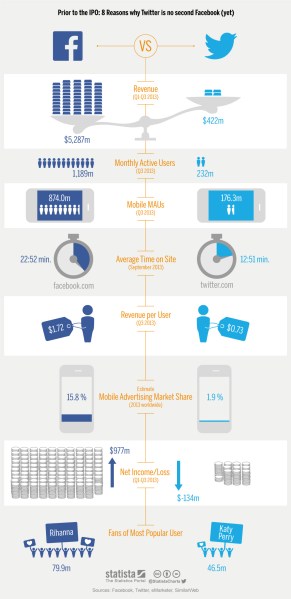Updated Nov. 9: Twitter’s IPO appears to have created just one billionaire, not three. We’ve corrected the headline.
If you bought Twitter at its opening price of $26 and sold it at today’s peak of $49.45, congratulations. You nearly doubled your money in about 90 minutes of celebrity-riddled excitement on the floor of the New York Stock Exchange.
But will Twitter’s stock price ever see $50 again? I’m skeptical. After this week’s excitement dies down, a more sober crowd will start to look at Twitter’s fundamentals. And they aren’t good.
Twitter’s revenue so far in 2013 is under $500 million. It has less than 20 percent as many users as Facebook, and it lags far behind Facebook in its capability to make money from mobile users. These folks spend less time on the site and generate far less revenue than Facebook.
And Twitter has yet to turn a profit.
But enough about Facebook. Compare Twitter’s price-to-sales ratio to that of Google, LinkedIn, or even Tesla, and it looks insanely overpriced.
Worse, the company has a long history of mismanagement and misdirection, chronicled in the new book “Hatching Twitter” by New York Times columnist Nick Bilton. Granted, the new chief executive, Dick Costolo, is a smart guy with a firm hand, but the founders — newly minted billionaire Evan Williams and already-a-billionaire Jack Dorsey — have had a famously volatile approach to managing the company, which I suspect has left workers confused about the company’s ultimate direction, even today. (Update Nov. 9: Dorsey was already a billionaire, thanks to his stake in Square, and Peter Fenton merely represents the shares held by Benchmark, the VC firm he belongs to. See this report in Forbes.) Is it a platform for developers? Not likely, given the high-handed way Twitter has treated developers in the past. Is it a source for useful business data? Perhaps some day — but for now, much of that data is locked behind the walls of Twitter HQ. Is it a marketing platform? Of course — but what does it mean to be an advertiser on Twitter, and how do you stand out from an increasingly loud chorus of other marketers? Twitter has yet to do a good job of explaining its ultimate mission and purpose to the wider world, and I’d wager a guess that most employees are just as confused as we are.
The real danger to Twitter — and the reason I’m using it less and less — is that it is slowly turning into nothing more than a marketing platform. Whether you’re an individual or a brand, using Twitter means broadcasting your virtues to an audience of fans. In short, it’s the world’s best platform for bragging (humble or otherwise).
Sure, people can form real, human connections on Twitter. Conversations do happen. And there are a lot of reasons to love the way it lets you use any identity, pseudonymous or not, rather than tying user accounts to supposedly real-world identities the way Google+ and Facebook try to do.
But the intense constraints of the 140-character limit and the fact that it is largely a public broadcasting platform means that Twitter, by its very nature, tends to encourage exhibitionism, snarky retorts, quips, and bon mots. And sprinkled in between those self-promotional “discussions,” you find a handful of actual ads. In short, everything is promoting something.
For me, that feels a little thin. Magazine ads work precisely because the magazine is not all advertising (otherwise, it would be a catalog). Radio ads work because they’re separated by a few minutes of music or news. Ads on Facebook work because when you’re on Facebook, you may be communicating with your deepest personal connections.
But on Twitter, where every tweet is just another chance for someone to say “look at me,” the human element — the content — is missing.
That’s why Twitter has had a hard time making money and why, I suspect, it will face a long, hard slog toward profitability over the next few years.
Its best shot is at using its $2 billion war chest to make some strategic acquisitions — preferably companies that already know how to make money.



